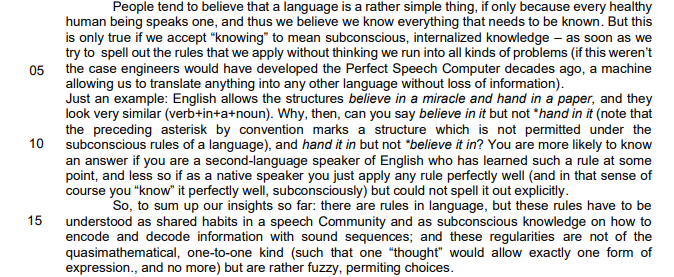Questões de Concurso
Sobre análise sintática | syntax parsing em inglês
Foram encontradas 259 questões
We use Coordinating Conjunctions to join independent clauses (that is, clauses that have complete meaning on their own, without needing another clause to make sense), phrases or just words.
Na língua inglesa, os sujeitos coletivos podem ser tratados como singular ou plural, dependendo do contexto da frase.
We can use as an example of morphology conversion in English the words: teapot, armchair.
Determining phrases precede the noun to indicate its specificity, possession, quantity, and distance, among other characteristics. As in the sentence: Two students passed the exam with flying colors.
Em orações subordinadas relativas, para adicionarmos informações ao antecedente, usamos os pronomes relativos (who, whom, whose, which e that).

The words “eat, with and
delivery” are classified as:
Read Text I and answer question.
Text I
How to have a healthier relationship with your phone
A few years ago, a Google employee sent an email to thousands of her co-workers: What if for six weeks straight, you spent one night per week without technology? The email was from Laura Mae Martin, Google’s executive productivity adviser, a role that, among other things, was created to help staff members foster healthier relationships with their gadgets and apps. After she sent the note, Ms. Martin was flooded with responses from coworkers eager for a respite from some of the very products they helped build. Thousands of employees have since participated in the annual “No-Tech Tuesday Night Challenge,” said Ms. Martin.
The problem she was trying to solve isn’t unique to Google workers. One survey found that Americans say they spend too much time on their phones. But dramatic solutions – a digital detox, a phone downgrade or a complete exit from social media – may feel impractical.
Is it possible to have a healthy relationship with technology while still using it daily? Fortunately, according to experts, the answer is a resounding ‘yes’ and here are a few things you can try:
First, start with one simple question.
You know that urge you get to reach for your phone without realizing it? And then, before you know it, you’re an hour into a social media binge? If you want to peacefully coexist with technology, you need to get a handle on those impulses, said Richard J. Davidson, the founder and director of the Center for Healthy Minds at the University of Wisconsin-Madison. According to him, people should start by noticing when they have an urge to lift their phone or open social media on their browser window. By becoming conscious of what you’re about to do, you’re interrupting an automatic behavior and awakening the part of your brain that governs self-control, he added. As one research article suggests, awareness of your actions can help you rein in bad habits.
Secondly, take the “mobile” out of your mobile devices.
Dr. Anna Lembke, a professor of psychiatry and addiction medicine at Stanford University School of Medicine, said one of the biggest problems with smartphones is what she calls “texting while running to catch a bus.” Using our devices while we’re on the move – walking from meeting to meeting, taking a child to school or catching a bus – prevents us from being more engaged in our lives, Dr. Lembke said.
One way to create harmony with technology is to limit your phone use when you’re on the move. Headed out for a walk? Turn off your notifications. Going to grab a coffee? Leave your phone on your desk. If you’re feeling brave, try powering down your phone while in transit. It won’t buzz with notifications, text messages or phone calls, which Dr. Lembke said could help you focus on the world around you.
Last of all, make technology work for you.
One thing experts agree on: To forge a healthy relationship with technology, you need to be in control of it and not the other way around. Think about your gadgets as tools that you decide how to use.
“Make it work for you, not against you; whether it’s an email program or your dishwasher, it’s the intention behind how you’re using it that really makes the big difference”, said Ms. Martin, the productivity expert at Google.
(Adapted from:
https://www.nytimes.com/2024/03/21/well/social-media-phone-addiction.html)
I - “The problem she was trying to solve (…)”. II - “First, start with one simple question.” III - “(…) or a complete exit from social media – may feel impractical.” IV - “Last of all, make technology work for you”. V - “(…) eager for a respite from some of the very products they helped build”.
Choose the correct answer:
Julgue o item subsequente.
Nominal clauses cannot stand alone as complete
sentences because they are dependent clauses. Instead,
they function as nouns within a sentence and rely on an
independent clause to form a complete thought.
Idiom 1: Better late than never Idiom 2: go back to the drawing board Idiom 3: make a long story short
Text 06 – Levels of Language (Variation).

From: English Around the World (Cambridge Introductions to the English Language). P. 19 (topic 2.2) Kindle Book. At https://ler.amazon.com.br/?asin=B088TFZHRD&ref_=kwl_kr_iv_rec_1.